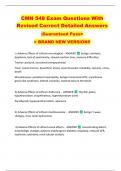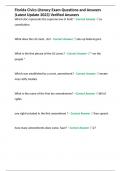CMN 548 Exam Questions With
Revised Correct Detailed Answers
|Guaranteed Pass>
> BRAND NEW VERSION!!
1)Adverse Effects of Lithium-neurological - ANSWER benign, nontoxic:
dysphoria, lack of spontaneity, slowed reaction time, memory difficulties.
Tremor: postural, occasional extrapyramidal
Toxic: coarse tremor, dysarthria, ataxia, neuromuscular irritability, seizures, coma,
death
Miscellaneous: peripheral neuropathy, benign intracranial HTN, myasthenia
gravis-like syndrome, altered creativity, lowered seizure threshold.
2) Adverse Effects of Lithium-Endocrine - ANSWER Thyroid: goiter,
hypothyroidism, exophthalmos, hyperthyroidism (rare)
Parathyroid: hyperparathyroidism, adenoma
3) Adverse Effects of Lithium-Cardiovascular - ANSWER benign T-wave
changes, sinus node dysfunction
4) Adverse Effects of Lithium-renal effects - ANSWER concentrating defect,
morphologic changes, polyuria (nephrogenic diabetes insipidus), reduced GFR,
nephrotic syndrome, renal tubular acidosis
,5) Adverse effect of Lithium-dermatological effect - ANSWER Acne, hair loss,
psoriasis, rash
6) Adverse effects of Li-GI effect - ANSWER appetite loss, nausea, vomiting,
diarrhea
7) Miscellaneous adverse effects of Li - ANSWER altered carbohydrate
metabolism, weight gain, fluid retention
8) What patient education regarding sodium intake and excretion should be
included when prescribing lithium? - ANSWER •Excessive sodium (dramatic
diet changes) intake lowers lithium concentrations
•Too little sodium (fad diets) can lead to potentially toxic concentrations of
lithium
•Decrease in body fluids (excessive perspiration) can lead to dehydration &
lithium toxicity
9) What cardiovascular assessment should be done prior to initiating lithium
therapy? - ANSWER •Lithium can cause diffuse slowing, widening of
frequency spectrum, and potentiation & disorganization of background rhythm on
ECG
oBradycardia & arrhythmias may occur (particularly in pts with cardiovascular
disease)
oCan reveal Brugada's syndrome which is potentially life threatening
•Before starting lithium ask about heart conditions, unexplained fainting, & family
hx of problems or sudden unexplained death before age 45
,10) Weight gain during lithium therapy is caused by what mechanisms/actions? -
ANSWER •Poorly understood effects of lithium on carbohydrate metabolism
•Can also result from lithium-induced hypothyroidism, lithium-induced edema, or
excessive consumption of soft drinks & juices to quench lithium-induced thirst
11) How is lithium-induced postural tremor treated? - ANSWER •Tremor:
most notable in outstretched hands, especially in finger tips & during tasks
involving fine manipulations
•Tx: divide the daily dosage, using a SR formulation, reducing caffeine intake,
reassessing the concomitant use of other medicines, & treating comorbid anxiety
oPropranolol & primidone can reduce the tremor
ow/ hypokalemia- K+ may reduce the tremor
•If tremor is SEVERE- suspect toxicity
12) Discuss the cause of polyuria, the most common renal effect of lithium, and its
treatment. - ANSWER •Cause: lithium antagonism to the effects of
antidiuretic hormone which thus causes diuresis
•Tx: fluid replacement, use of lowest effective dose of lithium, single daily dose of
lithium
oThiazide diuretic can be used: HOWEVER, when a diuretic, lithium dosage should
be halved & diuretic shouldn't be started for 5 days because the diuretic is likely
to increase lithium concentrations
13) Along with laboratory monitoring of serum concentrations, what other
laboratory studies is considered prudent to monitor for serious renal adverse
effects? - ANSWER •Serum creatinine concentration, urine chemistries & 24
hours urine volume at mos intervals.
•If creatinine levels rise, than either need MRI or more frequent monitoring
, 14) What effects can lithium have on thyroid hormones? Who is at highest risk in
developing lithium induced hypothyroidism? What labs should be considered? -
ANSWER •Causes a generally benign and often transient diminution in the
concentration of circulating thyroid hormones
oGoiter, reversible exophthalmos, hyperthyroidism, & hypothyroidism
•Women are at highest risk during the first 2 years of tx
oPersons taking lithium for BP are twice as likely to develop hypothyroidism if
they develop rapid cycling
•About 50% of people taking lithium develop lab abnormalities
15) Review signs and symptoms of Lithium Toxicity and management? - ANSWER
Mild to moderate intoxication lithium level 1.5-2.0 mEq/L
GI -vomiting, nausea, diarrhea, abdominal pain, dryness of mouth
Neuro- Ataxia, dizziness, slurred speech, confusion, nystagmus, lethargy or
excitement, muscle weakness. (2015) Sadock. Pg. 987
Ataxia, coarse tremor, confusion, diarrhea, drowsiness, fasciculation, and slurred
speech. (2015 Butler).pg 235
16) Moderate to severe intoxication (lithium level 2.0-2.5 mEq/L - ANSWER
GI- anorexia, persistent nausea and vomiting
Neuro- blurred vision, muscle fasciculations, clonic limb movements, hyperactive
DTR's, choreoathetoid movements, convulsion delirium, syncope, ECT changes,
stupor, coma, circulatory failure (Low BP, Cardiac arrhythmias, conduction
abnormalities. (2015) Sadock. Pg. 987
Acute Toxicity can present as acute delirium with disorientation, fluctuating levels
of consciousness, hallucinations, and extrapyramidal symptoms; may manifest as
a catatonic stupor. (2015) Butler. Pg. 235





